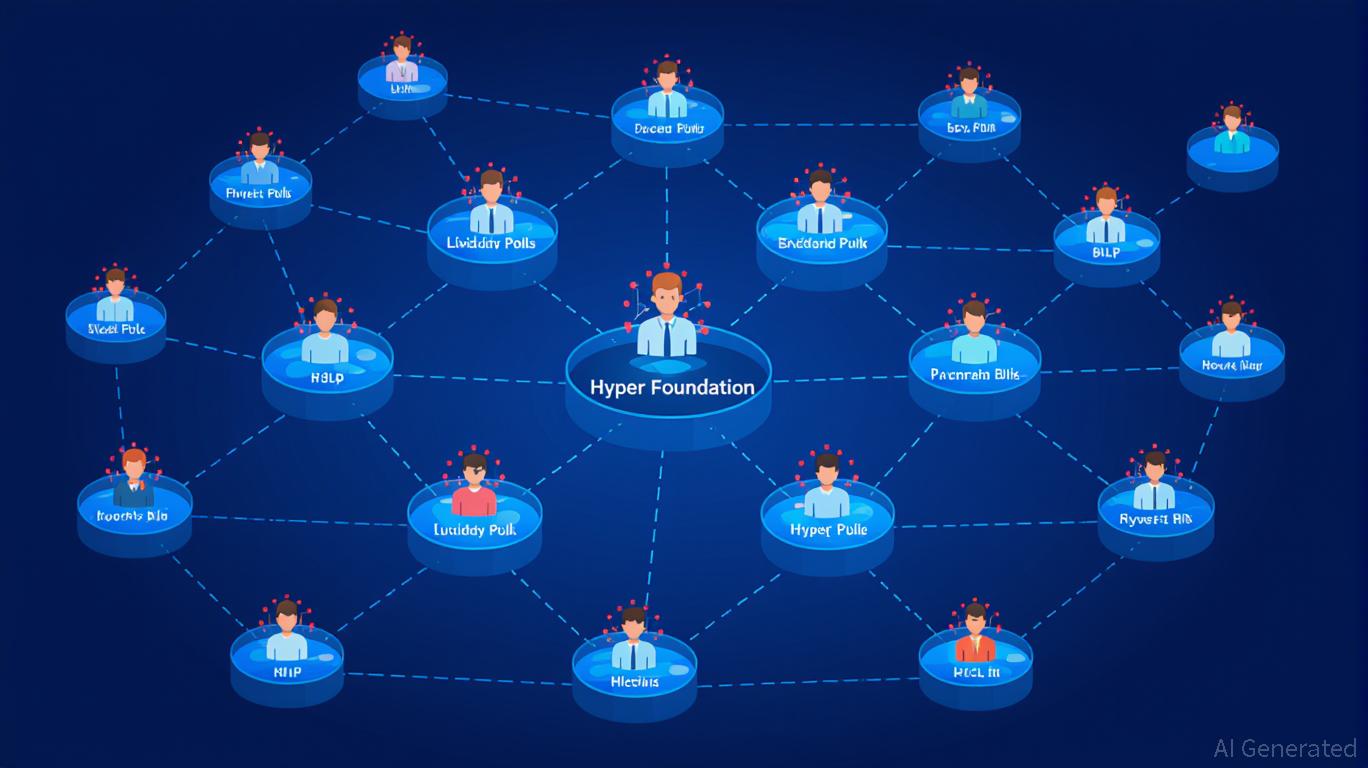ICP Caffeine AI: Revolutionizing Blockchain with Advanced AI Technology
- ICP Caffeine AI, developed by Dfinity, merges AI and blockchain to enable no-code app development via natural language prompts and Motoko's secure programming framework. - The platform's integration with ICP's decentralized infrastructure and orthogonal persistence attracted 2025 hackathon participants, showcasing its developer accessibility. - ICP's token surged 45% to $5.20 in November 2025, driven by expanded prompt capabilities and Hong Kong's institutional push for AI-tokenized infrastructure adopti
Technological Innovation: Redefining Application Creation
ICP Caffeine AI sets itself apart by allowing users to create and launch web applications through natural language instructions, removing the traditional need for coding, as highlighted in a
One standout feature is orthogonal persistence, which abstracts away database management so developers can concentrate on building application logic, as reported by VentureBeat. This streamlined approach has already drawn a wide range of users, including those without technical backgrounds, as seen during the July 2025 hackathon where many apps were built using Caffeine, according to VentureBeat. These capabilities make ICP Caffeine AI a game-changer in the AI-native blockchain arena, seamlessly connecting AI functions with decentralized infrastructure.

Market Performance and Institutional Support
The recent debut of ICP Caffeine AI to the public has sparked significant market enthusiasm. On November 4, 2025, the ICP token surged by 45%, climbing to $5.20 for the first time since August, according to a
Hong Kong’s proactive policies further enhance the project’s significance. The city’s Financial Secretary, Christopher Hui, has stressed the importance of integrating AI, tokenization, and blockchain into financial products, with intentions to use these technologies for long-term revenue sources like infrastructure assets, according to a
Comparative Landscape and Investment Risks
Despite ICP Caffeine AI’s technical strengths, the AI-native blockchain field remains highly competitive. Projects like SingularityNET and Fetch.ai have developed decentralized AI marketplaces and autonomous platforms, but none have matched ICP’s commitment to developer accessibility and robust security, as VentureBeat points out. Nonetheless, the industry faces notable risks. For example, C3.ai (AI), a publicly traded AI firm, has experienced sharp volatility due to management changes and legal issues, with its stock plummeting 25% in a single day after disappointing earnings, as detailed in a
Nvidia’s rapid ascent to a $5 trillion market cap in October 2025 illustrates the broader momentum in AI investments, as noted by VentureBeat. While ICP Caffeine AI operates in a distinct segment, it could benefit from the same forces driving AI adoption. Experts remain split on whether the sector is experiencing a bubble, with some cautioning about inflated valuations and others focusing on AI’s long-term economic promise, according to VentureBeat. For ICP Caffeine AI, its unique blend of AI creativity and blockchain’s trustless framework could help shield it from wider market downturns.
Investment Outlook and Strategic Perspective
The investment thesis for ICP Caffeine AI is built on three main factors: its technological edge, institutional engagement, and potential for market expansion. By making decentralized app development accessible to non-technical users, the platform could drive mainstream adoption of AI-native blockchain solutions. Hong Kong’s regulatory pilots with tokenized infrastructure assets, as reported by LookOnChain, also create promising opportunities for ICP, such as enabling transparent income streams from charging stations or renewable energy projects.
Nevertheless, investors should exercise caution. The AI-native blockchain sector is still in its early stages, and changes in regulations or technical challenges could slow progress. For instance, a FinCEN report on Hong Kong’s involvement in opaque financial transactions underscores the risk of regulatory intervention, even as the city pushes innovation. Moreover, while ICP’s market cap has grown, it is still much smaller than established AI giants like Nvidia, which benefit from steady revenues and strong global recognition, as VentureBeat notes.
Conclusion
ICP Caffeine AI stands at the intersection of AI and blockchain, delivering a distinctive value proposition in a fast-changing market. Its technological progress, institutional support, and alignment with global trends in tokenization and sustainable energy position it as a leading project in the AI-native blockchain sector. Although challenges remain, its potential to transform application development and decentralized infrastructure makes it a noteworthy consideration for investors looking to participate in the next wave of digital finance.
Disclaimer: The content of this article solely reflects the author's opinion and does not represent the platform in any capacity. This article is not intended to serve as a reference for making investment decisions.
You may also like
Stellar News Today: Blockchain Opens Up Clean Energy Investment Opportunities While Turbo Taps Into $145B EaaS Sector
- Turbo Energy partners with Stellar and Taurus to tokenize solar energy financing via blockchain, targeting Spain's supermarket sector. - The pilot uses Energy-as-a-Service (EaaS) models with tokenized PPAs, enabling fractional investor ownership and reducing capital barriers. - Blockchain streamlines liquidity and transparency, aligning with a $145B EaaS market growth projection by 2030 driven by sustainable infrastructure demand. - Taurus manages token compliance via its platform, while Stellar's low-co
Ethereum Updates: Major Holders Increase Their Ethereum Stash Fivefold While BTC/ETH ETFs See Outflows—Altcoins Draw in $126 Million
- Bitcoin and Ethereum spot ETFs lost $605M in outflows, contrasting with $126M inflows into Bitwise's Solana ETF (BSOL), highlighting shifting investor priorities toward altcoins. - Ethereum's largest whale quintupled ETH holdings to $138M while closing Bitcoin longs, reinforcing institutional confidence in Ethereum's long-term potential amid stable technical indicators. - Solana's ETF success ($545M total inflows) reflects growing institutional demand for altcoins despite 16% price declines, driven by it
Red Bull Racing’s advantage? An engineer who approaches workflows with the precision of timing laps
Hyperliquid's Growing Influence in Crypto Trading: Can It Maintain Long-Term Investment Appeal?
- Hyperliquid dominates 80% of 2025 perpetual contract market via on-chain governance and user-driven liquidity innovations. - Centralized governance (HIP-3 protocol, USDH stablecoin launch) balances permissionless market creation with validator dominance risks. - HLP liquidity model generates $40M during crashes but faces regulatory scrutiny and token economics challenges from 2025 HYPE unlock. - TVL growth to $5B and 518K active addresses highlight adoption, yet governance centralization and institutiona
